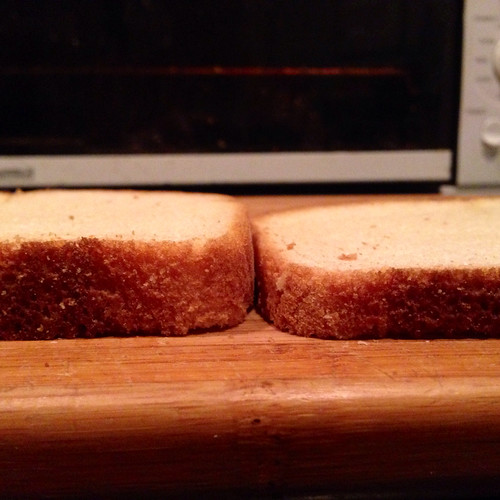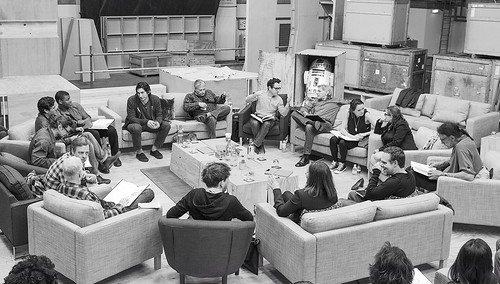This is a blog for writing about writing. I've recently finished my first novel, and am embarking on the second. Anything of interest that I learn along the way will be deposited here for safekeeping.
Friday, May 16, 2014
Best thing since
These are two adjacent slices from a loaf of Arnold's Whole Grain Country White Bread. They are not the same width. I haven't seen the Whole Grain Country White Bread episode of How It's Made, so I can't begin to guess how a technology I thought had been tuned to a cinnamon hum might have slipped its gears. I wouldn't have guessed that independently adjustable slice width would even be built into the machine that cuts the loaves, or, having been built in, that it might be misadjusted without anyone noticing. But it was, and it was, and here we are, making a sandwich with unmatched slices of bread.
Way to go, America.
Wednesday, April 30, 2014
My reaction to the Episode VII cast announcement
Yesterday, starwars.com announced most of the main cast of Episode VII. In addition to the six returning regulars (Mark Hamill, Harrison Ford, Carrie Fisher, Peter Mayhew, Anthony Daniels, and Kenny Baker), they named seven new cast members: John Boyega, Daisy Ridley, Adam Driver, Oscar Isaac, Andy Serkis, Domhnall Gleeson, and Max von Sydow. A lot of fans greeted this announcement with disappointment, chiefly because they announced only one new female lead. I understood that response, but I didn't share it — not because I don't share the desire for more female characters in the Star Wars universe, but because I didn't see quite the same announcement they did. In fact, I saw the possibility of an excitingly diverse cast and a cause for celebration (yub-yub), not outrage.
Before I explain, I should point out that an incomplete cast list is a terrible way to judge the diversity of a film. What matters much more is how the characters are used. If you were to look at the cast list for Alien without knowing anything about the script, you'd see a sausage-fest of six men and two women; you'd have no way to know that Ellen Ripley would dominate the story — and go on to become one of the most iconic heroines of science fiction to boot. My advice would be to wait until more information is available before giving in to disappointment (or excitement, for that matter). Failing that, read on.
One bit of information that got lost in the excitement of the cast announcement was the fact that casting is not complete. The official casting call included "a second young female, also late teens, tough, smart and fit" — and, unofficially, biracial — which is probably the part Lupita Nyong'o and Maisie Richardson-Sellers were/are in consideration for. After the irked response to the casting announcements, sources clarified that this is indeed still an uncast role, which fits with reports from a few days ago that Abrams still had casting duties to finish before filming begins in a couple of weeks.
Taking this as gospel, that leaves us with six original cast members and eight newcomers. Abrams had little to no control over the genders of the original cast, so let's leave them alone and make some guesses about the newbies. Serkis (Gollum in Lord of the Rings) is King of Motion Capture; we can guess that he'll be playing a CGI alien of some sort, which could make the question of his gender and ethnicity approximately as relevant as Mayhew's. It's been widely speculated that Adam Driver will play a villain, which is also a likely bet for Max von Sydow, who could be following in the distinguished footsteps of Christopher Lee and Peter Cushing. If true, that gives us two white dudes as villains, and leaves us with five likely heroes in the core cast: John Boyega, Daisy Ridley, Oscar Isaac, Domhnall Gleeson, and an unnamed biracial woman.
That's a black dude, a white woman, a hispanic dude, a white dude, and a biracial woman as the five core heroes of a Star Wars movie — maybe. Leaving aside my excitement about the specific actors cast in those roles (and I have a lot of excitement about John Boyega after Attack the Block) that looks to me like a laudably diverse main cast. (Boyega is getting top billing, too, if that means anything.) If we go on to consider that Ridley's character is rumored to be the daughter of Han and Leia (which nails down her ethnicity pretty tightly), and maybe toss in my pet theory that von Sydow is a holdout Imperial officer (which means old white dude), it looks to me like Abrams chose diversity where he could, and where many directors would not have.
Do I know that all of my guesses and inferences are correct? Of course not; there's still plenty of room to be disappointed. And there's no way Abrams will get all the way to equal gender representation, which is the ultimate goal. But I suspect, when the first trailers are released, we're going to wonder what all the fuss was about, and either give Abrams a thumbs-up for expanding the diversity of the Star Wars universe or find something new to complain about.
(I know where I'm putting my money.)
Friday, January 31, 2014
The default
So: Alex Dally Macfarlane wrote a post on Tor.com in which she suggested that science fiction maybe might stop defaulting to a gender binary. (Go read that essay first if you haven't; it's pretty good, and the first in a series.) Presumably she looked at the world around her, saw that lots of people aren't happy checking the "male" or "female" tickyboxes anymore, and began wondering why she couldn't look around, say, the Enterprise and see the same kind of variety. Predictably, I guess, various people, including a successful writer of testosterone-soaked formula urban fantasy, replied, "OO ARG WHY ARE YOU KILLING SCIENCE FICTION?!?" (I know he is successful because he makes a point of telling us in his response.) Jim C. Hines then interlinearly lampooned Brick Hardmeat's response, and Mr. Rockgroin re-lampooned him, and then I got dizzy and had to sit down for a while.
My one small, unremarked contribution to the conversation, which I left in the comments on Tor.com, was to suggest that maybe the "OO ARG!" apeshitters, like Mr. Hardcheese and the fellow on Tor's Facebook page who called Macfarlane an "idiotic woman who thinks everyone should put more 'genders' in their SF or else," don't actually understand what Macfarlane meant when she used the word "default":
Some people seem to be reading this fairly modest proposal as more radical than I think it is. If I can attempt an analogy without putting words in Alex's mouth:
Once upon a time, "white" was the default in science fiction. (Some might say it still is, but that's a different discussion.) Despite the fact that the world at the time was filled with people of color, when people imagined the future the default assumption was that the characters would be white. Not everyone, and not every work, but that was the default assumption, and if you did something else people would likely say you were doing something different or daring or radical. Nyota Uhura was a big deal.
If someone had posted, on the hand-mimeographed blogs of the day, "I want an end to the default of white people in science fiction stories," would any of us, today, find anything the least bit objectionable there? I hazard that "white folks should be the default for science fiction" sounds outmoded and offensive to everyone here. It's not a suggestion that nobody should ever write about white people, or even that there shouldn't be lots of stories about white people; just that, given the existence of people of color in the world of yesterday, it's pretty foolish to imagine that they'd be so darn hard to find in the worlds of tomorrow.
Today, the world is filled with vocal and visible intersex, genderfluid, trans, agender, genderqueer, and pangender people. It's pretty foolish to imagine that they'll be hard to find in the worlds of tomorrow—and yet they are. When we do find them, the author is often marked as doing something different or daring or radical, because the default state of the future, in contrast to the actual state of the present, is dual-gender.
Suggesting that we should rethink that default is not radical or mean or weird. It's not a call to reject every cisboy-meets-cisgirl story anyone writes in the future, or burn every book that fails to include an intersex person. It is—and again, I hope I'm not putting words in Alex's mouth—just a call to look at the world around us and question why today's actual, observable, awesome reality is not reflected in our predicted tomorrows.
That was all I wanted to say, but I figured I'd say it here as well.

